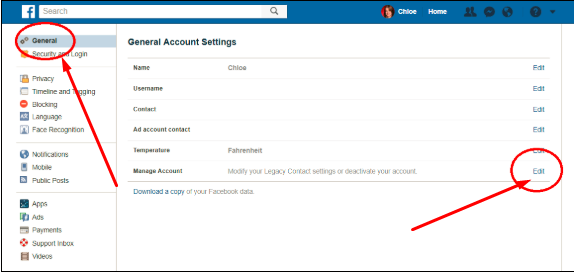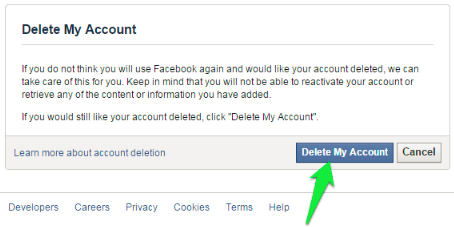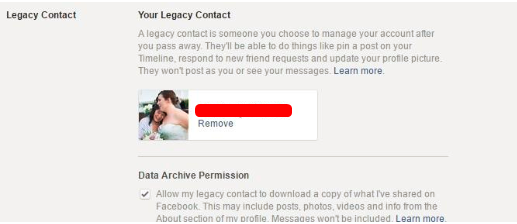If you're ready for a social media sites break, here's how you can delete Facebook.
How Do I Delete My Facebook Account
Deactivating
Facebook gives you 2 alternatives: two choices: deactivate or remove
The first couldn't be much easier. On the desktop computer, click the drop-down menu at the top-right of your screen and pick settings. Click General on the leading left, Edit beside "Manage Account" Scroll down and you'll see a "Deactivate My Account" link at the bottom. (Here's the direct link to use while visited.).
If you get on your mobile phone, such as making use of Facebook for iOS, similarly most likely to settings > Account settings > General > Manage Account > Deactivate.
Facebook doesn't take this gently - it'll do whatever it can to keep you around, including psychological blackmail about just how much your friends will certainly miss you.
Therefore, "Deactivation" is not the like leaving Facebook. Yes, your timeline will vanish, you will not have accessibility to the website or your account via mobile applications, friends cannot publish or contact you, and you'll lose accessibility to all those third-party solutions that utilize (or need) Facebook for login. However Facebook does not delete the account. Why? So you could reactivate it later on.
Just in case that anticipated re-activation isn't in your future, you ought to download a copy of all your data on Facebook - posts, images, videos, chats, etc.-- from the settings menu (under "General"). Exactly what you locate may surprise you, as our Neil Rubenking found out.
Account Removal
To totally remove your Facebook account forever and ever, go to the Delete My Account page at https://www.facebook.com/help/delete_account. Simply be aware that, per the Facebook data use policy "after you eliminate information from your profile or delete your account, copies of that information might continue to be viewable somewhere else to the degree it has actually been shown others, it was otherwise distributed pursuant to your privacy settings, or it was copied or kept by other customers.".
Translation: if you composed a comment on a good friend's status update or photo, it will remain after you delete your personal account. Several of your posts as well as images could hang around for as long as 90 days after deletion, as well, though simply on Facebook web servers, not live on the website.
Deletion in behalf of Others
If you intend to alert Facebook regarding an individual you recognize is under 13, you could report the account, you narc. If Facebook could "sensibly verify" the account is made use of by someone underage-- Facebook prohibits children under 13 to comply with government law-- it will erase the account immediately, without informing anyone.
There's a different form to request elimination of represent people who are medically incapacitated and also therefore incapable to make use of Facebook. For this to work, the requester needs to show they are the guardian of the person concerned (such as by power of attorney) along with offer an official note from a doctor or clinical center that spells out the incapacitation. Edit any type of information required to keep some personal privacy, such as medical account numbers, addresses, etc.
If a user has passed away, a heritage get in touch with-- a Facebook friend or family member that was assigned by the account proprietor prior to they passed away-- can obtain access to that individual's timeline, once accepted by Facebook. The heritage contact might have to supply a link to an obituary or various other documentation such as a fatality certificate. Facebook will "hallow" the web page so the dead timeline lives on (under control of the tradition call, who cannot upload as you), or if chosen, remove it.
Assign a specific tradition get in touch with person to handle your account after your death. You could discover that under settings > General > Manage Account > Your Legacy Contact. Once you set one up, you'll obtain an alert every year from Facebook to check that the get in touch with ought to stay the very same, unless you pull out of that. You could also take the added step of making certain that after you pass away, if the tradition call does report you to Facebook as deceased, your account gets erased (even if the tradition contact wants the timeline to be hallowed).



